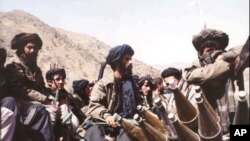The peaceful transfer of power in Afghanistan continues hope that the nation will build on its fragile democracy and enable its people to live in a more stable and prosperous environment. However, the threat from Taliban extremists remains strong and is a serious issue for president-elect Ashraf Ghani and outside nations supporting peace in Afghanistan.
Hassan Abbas is Professor and Chair at the National Defense University in Washington and author of The Taliban Revival. From serving as a police chief in Pakistan’s northwest to becoming an analyst, scholar and teacher, professor Abbas has a very close understanding about the broad group called Taliban and the network of individual groups that comprise the militant movement. He said, in excerpts from his conversation with VOA’s Jim Stevenson, that the most effective way to deal with the Taliban is to first understand its history.
ABBAS: At times we look at these issues only in a certain time frame. It is so very critical to look at issues from a historical perspective. We often want to jump to the conclusion and learn what is happening today without trying to understand the historical and cultural linkages to the issues.
Secondly, a very crucial point is to understand how some of these groups are abusing and misusing religious ideology, Islam in this case. At times, depicting all of such groups as representatives of mainstream Islam takes away all those forces who we want to join hands with who challenge Taliban and al-Qaida.
Last but not least, hard power cannot always resolve issues. It has to be a combination with soft power. By soft power I mean at one end, education, and at a different level, economic opportunities, but even most importantly, the role of civilian law enforcement agencies like police. Whenever we think of Iraq or Afghanistan or Somalia or another problem, Boko Haram or ISIS, we always think in terms of air force strikes. We think of heavy military equipment. Success in counter-terrorism can only come when it is done through a criminal justice system where you take out some people, target them, but show this can be dealt with in a rule of law setting so that ordinary people, young people, may not see those terrorists as heroes. They should be seen as criminals.
STEVENSON: Some would see that as a very Western approach. At times the West is not exactly the most welcome in terms of ideas. How do we work on trying to at least nudge them in that direction to try to embolden rule of law and soft power?
ABBAS: Maybe they call an assembly a jirga. Maybe they use different terminologies, but some of the basic ideas are not necessarily linked in terms of prime or central Western ideas. By and large, stability and peaceful order are things which every human being desires to have. In terms of organizational capabilities, modern technologies and organizational principle, the West has used and developed those. So the U.S. and the Western world have lot to offer. There is always a desire. There is always an intention on the other side. It is how we frame it and how ready we are to adjust and at times readjust, compromise and settle issues amicably and in a peaceful fashion.
STEVENSON: What are some of the main points Westerners should be aware of about the origins of the Taliban?
ABBAS: Westerners should be aware that the Taliban, these militant groups, is a product of conflict, primarily of the Afghan jihad years of the 1980s. Before that there were different militias and groups that would come and go for political reasons. This modern phenomenon of a militant group with a religious ideology came up in the 1990s, but they never looked back. From then onward, they benefitted at times from the distortion of religious ideas.
On the other hand, they would use elements of tribalism and tribal ethics which is called Pashtunwali. Then they would also join hands with criminal groups. Currently for the Taliban their major revenue chain is linked to the criminal gangs located in that operate in that area. Smuggling dens are located in all parts of the areas where the Taliban are strong. This is not a group solely linked to religious extremist ideas. It is about criminal groups as well. This is about a nexus between terrorism and organized crime. They borrow from religion and they are as greedy for power as anyone else would be. That is an overall comprehensive view which I think is very critical for the Western world to understand because in order to challenge them and tackle them, no one policy option can be used. You have to have focus not only on education, you have to look at how a civilian law enforcement model would challenge the criminal network.






